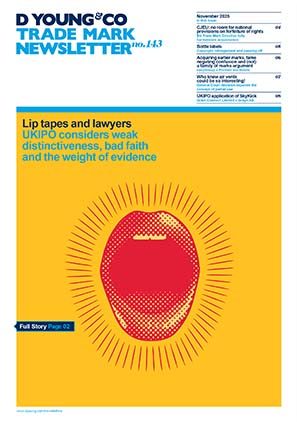A not so EASY task after all - UKIPO finds EASY mark devoid of distinctive character
In this case, easyGroup failed to register “EASY” in relation to various retail, transport, food and drinks, booking, hotel and temporary accommodation services as the mark is found to be descriptive and devoid of any distinctive character by the UKIPO pursuant to sections 3(1)(b) and (c) of the Trade Marks Act 1994 (TMA).
In an attempt to strengthen its rights in the “easy” family of marks, easyGroup sought to register the mark “EASY” in relation to various services under classes 35, 39 and 43. The application was however opposed by Alnair Limited (Alnair), proprietor of several earlier registrations for the mark “BIG EASY” (a chain of restaurants first established in 1991 and operating within London). The opposition was based on sections 5(2)(b) (likelihood of confusion), 5(3) (mark with a reputation), 5(4)(a) (passing off), 3(1)(b) (descriptive mark) and 3(1)(c) (non-distinctive mark) of the TMA.
Likelihood of confusion
easyGroup argued that the marks were conceptually dissimilar, claiming that BIG EASY was the nickname for the city of New Orleans whilst EASY would be associated with its business. easyGroup however failed to show that the public would indeed associate the word “EASY” alone with its business or the range of goods and services relied upon (although the UKIPO acknowledged that EasyGroup had an established business in the UK providing air travel to holiday makers).
The UKIPO therefore concluded that the term EASY would be given its ordinary meaning (and was, at best, “at the low end of the spectrum of distinctiveness”). As for the former point, the UKIPO found that many consumers may not be aware that BIG EASY is the nickname for the city of New Orleans but, nevertheless, concluded that the term would be familiar to the average consumer in the UK and likely be recognised as an American expression and/or as a term for an American city (even if consumers were unsure of which one).
It further found that its construction did not follow norms of the English language as the word “big” (usually used as an adjective) appeared before another adjective (that is, “easy”), creating an expression whose memorable impact resides in the combination of the two words (concluding that both words shared equal dominance and distinctive character within the mark).
The UKIPO therefore found that the respective marks had no conceptual similarity and shared a medium to medium-high level of visual and aural similarity.
The UKIPO ultimately found that use of EASY would not bring to mind the earlier BIG EASY trade mark and that there was consequently no likelihood of confusion between the respective marks. The UKIPO therefore rejected the opposition insofar as it was based on section 5(2)(b) TMA.
Passing off
Proceeding on the assumption that BIG EASY had the requisite goodwill, whilst recognising that the test for misrepresentation is different to that for likelihood of confusion the UKIPO stated that it doubted whether the difference between the legal tests would produce different outcomes. It did not think this to be the case in this instance as it rejected the opposition insofar as it was based on section 5(4)(a) TMA.
Mark with a reputation
Again, assuming that BIG EASY enjoyed a reputation in the UK for restaurant services, the UKIPO went on to consider whether the public would make the required mental link between the respective marks.
Although the UKIPO acknowledged the level of similarity required for the public to make the necessary mental link is less than the level of similarity required to create a likelihood of confusion, it found that the lack of any conceptual similarity combined with the low level of distinctive character of the EASY mark was such that one mark was not likely to bring the other to mind. The UKIPO therefore rejected the opposition on this ground.
Descriptiveness and lack of distinctive character
Having previously concluded that the term EASY would be given its ordinary meaning by consumers, the UKIPO found that the average consumer would understand the mark EASY to mean that the services offered do not require much effort to access, are easy to use, purchase, book, order, to pay for or in some other way do not require much effort.
The UKIPO therefore rejected the application on the basis that EASY is a descriptive term contrary to section 3(1)(c) that should remain free to use by other traders.
As a result the UKIPO also concluded that the EASY mark was devoid of any distinctive character pursuant to section 3(1)(b).
